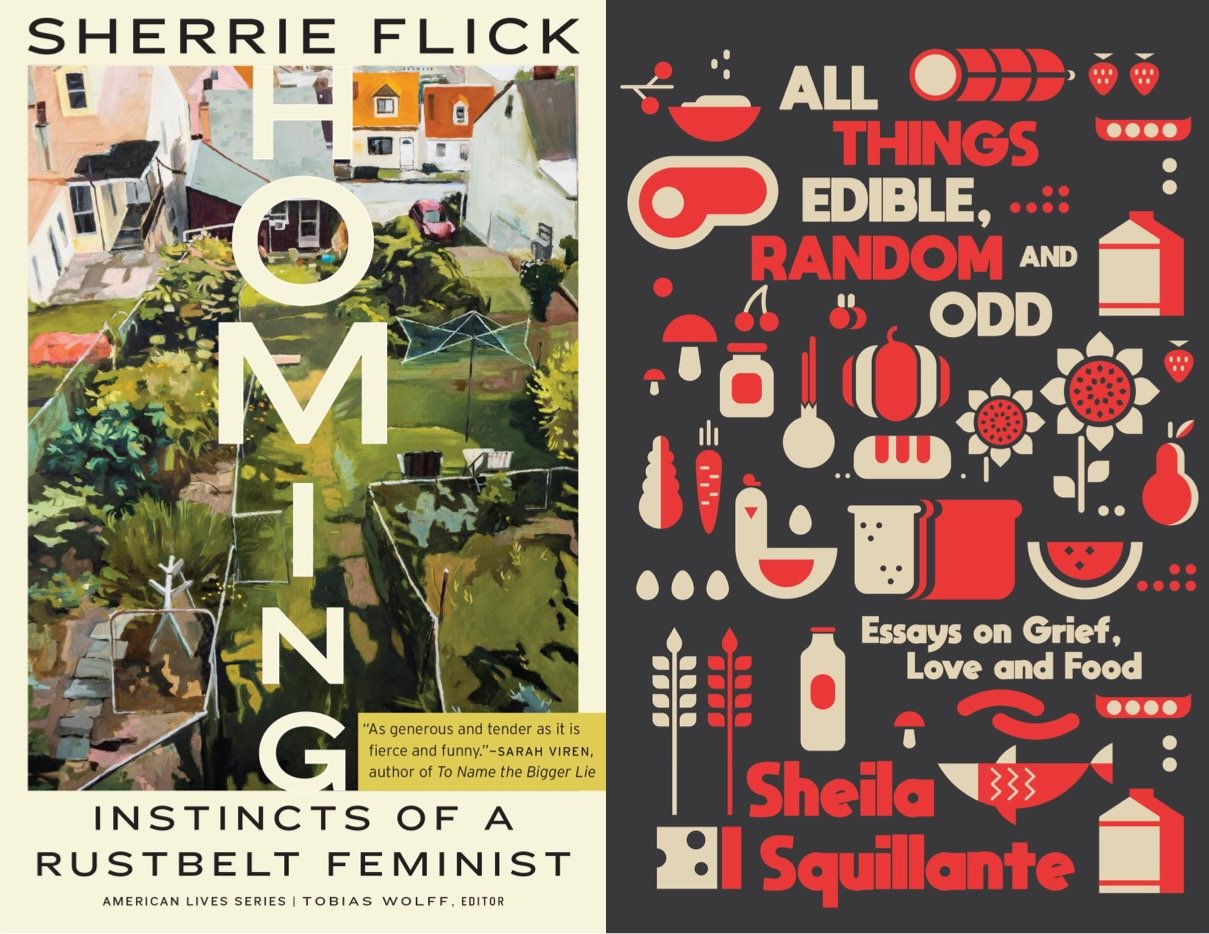Check Out These Essay Collections from Chatham’s Faculty
This year brought two different collections of personal essays from two of Chatham’s faculty. In one, Associate Professor of English Sheila Squillante explores her identity and relationship with her late father through form-breaking essays centered around food. In another, Senior Lecturer Sherrie Flick reflects on her upbringing as a “rustbelt feminist” in Southwestern Pennsylvania and beyond. Neither of them came together quickly or simply.
“All Things Edible, Random, and Odd: Essays on Grief, Love, and Food”
Squillante’s newest title, published in 2023 by CLASH Books, was 20 years in the making. The seed of the idea—a memoir about her relationship with her father told through food—formed when she was in her Master of Fine Arts program at Penn State University. Squillante submitted an essay she’d written in that course to a nonfiction contest at Glamour magazine, which published the piece in 2003.
“One of the things that came from this award was a meeting with an agent in New York City who was really enthusiastic about my writing,” Squillante said. But agents and publishing houses repeatedly turned down her idea to develop a memoir that read more like short stories. They wanted something that felt like a novel.
“I was still struggling with this idea of ‘memoir’ with a capital ‘M,’ with a narrative arc, but I was still continuing to write essays that were about other things in my life,” Squillante said. Those essays delved into her relationship with not just her father but her ex-husband, her husband, her children, her mother, and, ultimately, herself.
Sheila Squillante is an associate professor of English in Chatham University's Master of Fine Art in Creative Writing program.
“I was learning more about nonfiction,” Squillante said of the writing process. “I was feeling very free to do that experimentation, because I wasn’t thinking necessarily of those essays being part of a whole project.”
Eventually, they became “All Things Edible, Random, and Odd,” which takes distinct pleasure in playing with the form of the essay. Some pieces read like recipes. Others incorporate poetry, while yet another is billed as a mixtape. There’s even a spreadsheet where Squillante monitors her heart rate as she listens to recordings of Roy Orbison and k.d. lang.
“At a certain point, I realized what I had was what I set out to create,” she said. “It was a mosaic portrait, but not of my father. It was a portrait of me.”
In the first essay, Squillante recounts a conversation with her husband in which he suggests she is good with sensory memories. Her stories are punctuated with these types of details: the feeling of warm turtle meat on the tongue, the sound of a nostalgic song playing on the stereo, the sight of Mount Rainier’s peak through the window of an airplane.
“I think one thing that saves me here is that I was trained as a poet,” Squillante said. “Poets, we live in the lyric moment, which is not narrative and is a glimpse. It can be ephemeral and connected to feeling.”
“Homing: Instincts of a Rustbelt Feminist”
Flick’s “Homing” was published last month by The University of Nebraska Press. She began writing it after she joined a 2015 fellowship for writers, where she first explored writing longform nonfiction. Flick took a scrapped manuscript she’d developed after that fellowship and mined it for material for essays.
Sherrie Flick is a senior lecturer in Chatham's Master of Arts in Food Studies program.
“Finding Home,” one of those essays, is about the city steps in her neighborhood, the South Side Slopes. It moves from her father’s youth in rural Pennsylvania to her return to Pittsburgh in the late 1990s. Flick said she was interested in why the city steps are around and what they say about the city.
“Because I had been teaching food writing at Chatham for a bunch of years, I had been teaching this kind of personal narrative,” said Flick, who’s historically written short fiction, like the collection “Thank Your Lucky Stars,” published by Autumn House Press.
“The idea of writing nonfiction was a challenge in that there are set barriers and, sometimes, roadblocks to telling a story the way you want to,” Flick said. The timeline has to be factual. In fiction, you can shift plot elements around to make a story work—no need to worry about truth. “That made me think in different ways,” Flick said. “It helped me expand my creativity. Shifting to a genre that I’m not part of was a kind of strange thing, being this far into a career.”
Flick’s book weaves references to pop culture, films, regional history, and politics into her own personal narrative. “Talk Right,” a chapter about the Pittsburgh-area dialect, features observations on the boom and bust of the steel industry delivered through her brother, Jeff, who can’t shake his accent (“Keller,” he says while trying to offer a pronunciation of “color.”).
“Because I grew up in this region, I never felt like I could see it, like I was too close to it,” Flick said. “This book is really me trying to come to terms with a kind of homeland.”
Learn more about Chatham University’s MFACW and MAFS programs at chatham.edu.



